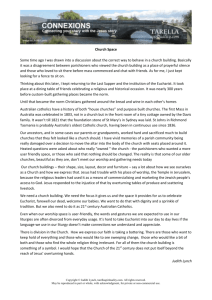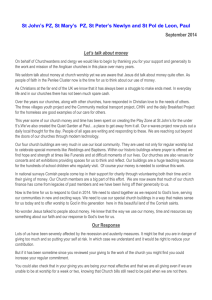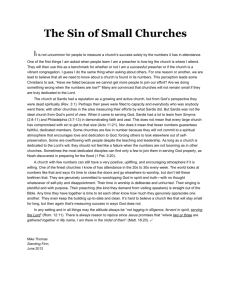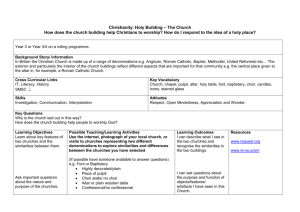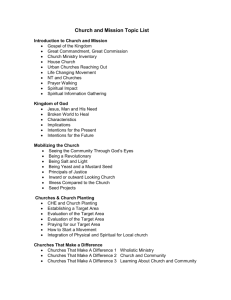parliament`s historic churches and chapels group
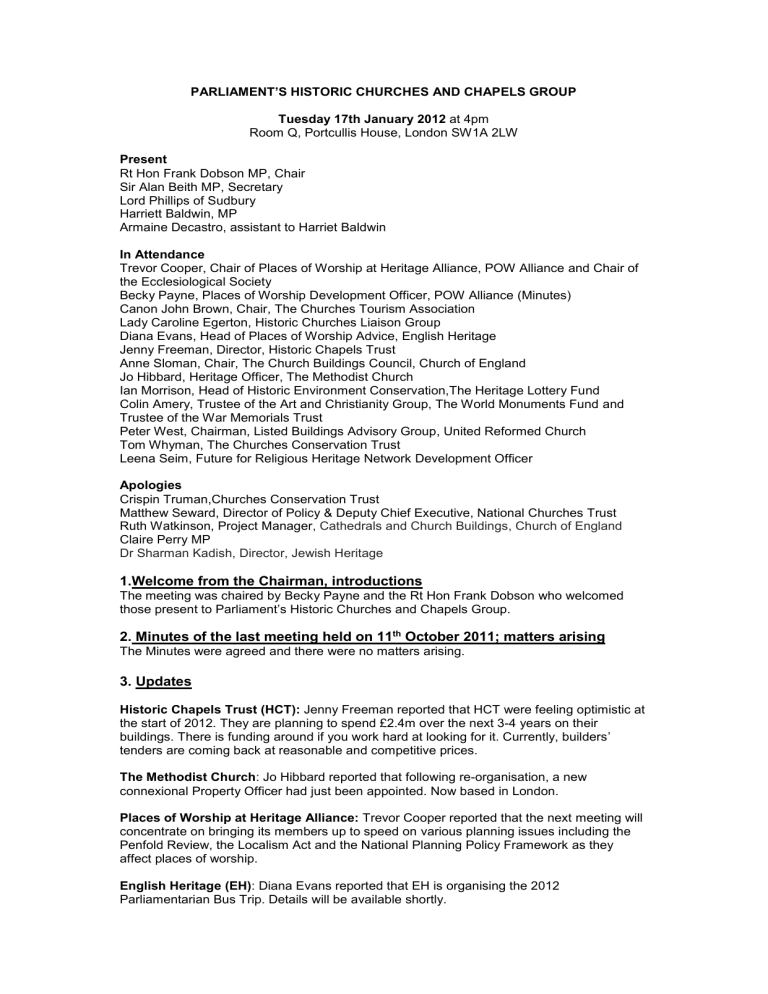
PARLIAMENT’S HISTORIC CHURCHES AND CHAPELS GROUP
Tuesday 17th January 2012 at 4pm
Room Q, Portcullis House, London SW1A 2LW
Present
Rt Hon Frank Dobson MP, Chair
Sir Alan Beith MP, Secretary
Lord Phillips of Sudbury
Harriett Baldwin, MP
Armaine Decastro, assistant to Harriet Baldwin
In Attendance
Trevor Cooper, Chair of Places of Worship at Heritage Alliance, POW Alliance and Chair of the Ecclesiological Society
Becky Payne, Places of Worship Development Officer, POW Alliance (Minutes)
Canon John Brown, Chair, The Churches Tourism Association
Lady Caroline Egerton, Historic Churches Liaison Group
Diana Evans, Head of Places of Worship Advice, English Heritage
Jenny Freeman, Director, Historic Chapels Trust
Anne Sloman, Chair, The Church Buildings Council, Church of England
Jo Hibbard, Heritage Officer, The Methodist Church
Ian Morrison, Head of Historic Environment Conservation,The Heritage Lottery Fund
Colin Amery, Trustee of the Art and Christianity Group, The World Monuments Fund and
Trustee of the War Memorials Trust
Peter West, Chairman, Listed Buildings Advisory Group, United Reformed Church
Tom Whyman, The Churches Conservation Trust
Leena Seim, Future for Religious Heritage Network Development Officer
Apologies
Crispin Truman,Churches Conservation Trust
Matthew Seward, Director of Policy & Deputy Chief Executive, National Churches Trust
Ruth Watkinson, Project Manager , Cathedrals and Church Buildings, Church of England
Claire Perry MP
Dr Sharman Kadish, Director, Jewish Heritage
1.Welcome from the Chairman, introductions
The meeting was chaired by Becky Payne and the Rt Hon Frank Dobson who welcomed those present to Parliament’s Historic Churches and Chapels Group.
2. Minutes of the last meeting held on 11
th
October 2011; matters arising
The Minutes were agreed and there were no matters arising.
3. Updates
Historic Chapels Trust (HCT): Jenny Freeman reported that HCT were feeling optimistic at the start of 2012. They are planning to spend £2.4m over the next 3-4 years on their buildings. There is funding around if you work hard at looking for it. Currently, builders ’ tenders are coming back at reasonable and competitive prices.
The Methodist Church : Jo Hibbard reported that following re-organisation, a new connexional Property Officer had just been appointed. Now based in London.
Places of Worship at Heritage Alliance: Trevor Cooper reported that the next meeting will concentrate on bringing its members up to speed on various planning issues including the
Penfold Review, the Localism Act and the National Planning Policy Framework as they affect places of worship.
English Heritage (EH) : Diana Evans reported that EH is organising the 2012
Parliamentarian Bus Trip. Details will be available shortly.
Historic Churches Liaison Group : Caroline Egerton reported that the 2012 HCLG
Conference will be taking place in May at the Lumen Church in Bloomsbury http://www.lumenurc.org.uk/
Heritage Lottery Fund (HLF) : Ian Morrison reported that HLF are on track to introduce a new Places of Worship Grant Programme from 1 st April 2013. It will be HLF-led. The priority will remain urgent repairs, but there will be more emphasis on community outreach and education.
The Repair Grants for Places of Worship budget for 2012-13 will be increased to £30m across the UK. This will have the effect of bringing the money available for Wales, Scotland and Northern Ireland on an equal (pro-rata) par with England.
Church Buildings Council, Church of England : Anne Sloman announced two competitions (with prizes!) being run by the Cathedral and Church Buildings Division of the
Church of England.
The first is designed to ‘inspire high-quality church seating designs (both chairs and benches) that can be retailed to parishes at an affordable price and that will combine comfort and practicality with good new design that is sympathetic to historic interiors’ . For more information go to: http://www.churchcare.co.uk/pdf_view.php?id=272
In the second, sponsored by the Jerusalem Trust, parishes are invited to submit a proposal for a new piece of art in their building. A contribution of £10,000 to the chosen scheme is on offer. For further information, see the http://www.churchcare.co.uk/pdf_view.php?id=257
5. Metal Theft
Diana Evans reported English Heritage was continuing to work with the Association of Chief
Police Officers, the British Transport Police and other bodies including the Church of
England.
Announced that the crime-fighting charity Crimestoppers and the Association of Chief Police
Officers (ACPO) are teaming up to offer a seminar on Metal Theft on 8 th February in
Kettering designed to provide a national platform for all those involved in tackling this crime to discuss the current issues and formulate a collaborative plan going forward on how best to bring down the levels of metal theft.
[ For more details and booking form go to http://www.metaltheftuk.com/ ]
Colin Amery reported the War Memorials Trust had recently formed a useful partnership with SmartWater and were encouraging the wider use of it by those who look after war memorials. Also stressed the importance of having an up to date inventory so you know exactly what you have.
All agreed that SmartWater is worth using, but it is not infallible. The problem is that metals can be melted down so quickly before identification can take place.
Noted that Ecclesiastical strongly recommend SmartWater on their website and also give examples of resulting successful prosecutions. They also recommend the use of roof alarms. For more information go to:- https://www.ecclesiastical.com/ChurchMatters/churchguidance/churchsecurity/smartwater/in dex.aspx
Anne Sloman reported that the Church of England had been doing a huge amount of lobbying of Ministers which does finally seem to be getting somewhere.
The main solution seems to be passing legislation to control scrap yards. (Noted that even
Bulgaria’s scrapyard industry has gone cashless).
Lord Phillips wondered what was the point of another Bill, if the problem seemed to be that the previous 1964 Act had not been enforced (see last minutes). Lord Phillips also said that he was strongly opposed to the cashless proposals on the grounds of individual liberty.
Anne Sloman replied that the British Transport Police seem to be hopeful that enforcement would have an effect.
Anne Sloman asked what had happened to the Private Member ’s Bill and Faulkner’s
Amendment?
Harriett Baldwin MP said that current Government action on this subject was covered in the answers to questions to The Parliamentary Under-Secretary of State for Transport, Norman
Baker, in the House of Commons on 12 th January 2012. This can be read at http://www.publications.parliament.uk/pa/cm201212/cmhansrd/cm120112/debtext/120112-
0001.htm#12011294000010
[
NB: I have also attached the relevant section as Appendix 1 to these minutes
].
[ NB2: The Private Member’s Bill Metal Theft (Prevention) Bill 2010-11, sponsored by Graham
Jones MP for Hyndburn, had its first reading on 15 November 2011 and was expected to have its second reading on 20 January 2012 .
Hansard Records for 20 th January records that second reading now postponed to 30 th March.
Summary of the Bill
A Bill to introduce a licensing scheme for scrap metal dealers; to enable magistrates’ courts to add restrictions to licences to deal in scrap metal; to require that financial transactions in trade in scrap metals be restricted to cashless payments; to give police officers powers to search properties owned by scrap metal dealerships; to provide that scrap metal proven to have been obtained through theft may be classified as criminal assets; to introduce criminal charges for theft of scrap metal which take into account aspects of the crime other than the value of the scrap metal stolen; and for connected purposes.
The !5
th November debate can be read at http://www.publications.parliament.uk/pa/cm201011/cmhansrd/cm111115/debtext/111115-
0001.htm#11111559000002 15 Nov 2011 : Column 708
The current version (including amendments) of the Bill can be read at http://www.publications.parliament.uk/pa/bills/cbill/2010-2012/0249/2012249.pdf
]
Harriett Baldwin made the point that these Bills are more likely to be effective in drawing attention to this major problem rather than ending up on the Statute Book.
The point was made that the Department for Business, Innovation and Skills (BIS) still needs to be convinced. Apparently BIS is concerned that banning cash transactions would put many small scrapyards out of business.
Diana Evans explained that technological responses to theft are being explored. For example, a system that putting identification marking through the cabling rather than on the external rubber coating is being researched; if effective this would mean any scrap metal dealer would be able to see with the naked eye if a cable had been supplied to telecoms or railway companies before arriving at his yard, .
Jenny Freeman said that HCT had installed sensors on one of their largest chapels. It cost
£6K, but so far (touch wood) no problems since.
Ian Morrison (HLF) reported that security measures will be included as eligible costs for
HLF grants in the future. Still defining exact criteria and conditions as there is a danger of continual applications for replacements. Insurance companies, as we know, are now capping amounts for repeat cases.
6. The Listed Places of Worship Grant Scheme
6(i) One-off Capital Grant Scheme
Becky Payne reported that POW Alliance had sent a letter to DCMS setting out members ’ thoughts on how the One-off Capital Grant for £1.1m, offered by John Penrose MP, Minister for Tourism and Heritage, could be distributed and spent.
On 13 th January, DCMS had written to the National Churches Trust and the Church of
England offering each organisation a share of the grant to distribute. The letter said that
DCMS “… calculated the share of the funding to the Church of England and the NCT on the
basis of the historic claims on the LPW grant scheme with Church of England receiving
£781,000 and the NCT £319,000 ”.
Anne Sloman said that the Church of England would be writing to DCMS proposing that their share should be equally divided between the Dioceses.
6 (ii) Rate of Payment for Third Quarter of the LPWGS
Diana Evans reported that the Third Quarter of the Listed Places of Worship Grant Scheme rate of payments had now been calculated. The payable rate is 45.9% as the Scheme was very heavily subscribed this quarter. The notice can be found here: http://www.lpwscheme.org.uk/prorata_percentage.htm
7
.
The Future for Religious Heritage, an European Network
Leena Seim (LS) explained that the aims of this Network are to:-
provide a platform for communication
identify Europe-wide solutions to shared problems
Current joint research is looking at good examples of places of worship being used in an extended way beyond worship.
Taking up a point raised at the last meeting, LS said that the Network would like to look at funding arrangements for places of worship across Europe, but currently many countries do not have a clear idea of how many building they have.
LS also said that the Network would definitely hope to do something in the future about the
VAT question.
A second conference is taking place in November in Venice. This is partly to build up contacts in Italy which is currently under represented within the Network.
Her part-time post and the Network are currently funded by some of its members. Looking for more funding possibly from the European Parliament.
8. Solar Panels/Energy Performance – an initiative from the Church of England
In Ruth Watkinson’s absence, this item was postponed until the next meeting.
9. Report on church tourism and other sacred sites
Canon John Brown (JB), Chair of the Churches Tourism Association explained CTA’s main objectives:-
To promote among churches and others the need to welcome tourists/visitors;
To educate churches and others about the benefits to individuals and communities which can arise from such a welcome.
He then set out what CTA see as good practice for the implementing these objectives, namely to urge:-
that all church buildings should be open to the public every day of the year;
that all who enter church buildings as visitors or tourists:-
should feel welcomed whether in person or through what is materially available to them by way of literature;
should have a sense of the presence of God within, and be assisted through the provision of literature or candles, or a place designated for the purpose to make their own response to that presence ifthey so wish;
should see or be able to read explanations of the meanings and significance of the building, its architectural presentation and symbolism, and its contents in respect of the practice of the Christian faith eg. The altar, the font, the pulpit, the layout of the building as a whole, and of its significance within the life of the community in which it is located;
should have available to them either free or for minimal expense, literature relating to the key contents of Christian Faith;
should have available to them a place, stand or receptacle, and the means whereby they can leave requests for prayer;
should be invited to make an entry in a Visitors’ Book, briefly identifying themselves and giving room for comment on the value to them of their visit;
should be provided with opportunity to make a monetary offering if they so wish, and be provided with some indication of the cost of maintaining the
building and supporting its work, and that reliance is entirely upon voluntary giving;·
should be provided with information as to a representative of the Church with whom contact can be made either at the time of the visit or subsequent to it.
JB said that CTA is working closely with VisitEngland (VE) to find ways of how churches can promote themselves through the VE website.
Getting churches to open their doors is important. Some dioceses are starting to collect examples where income has increased considerably once a church has opened up.
Frank Dobson said he and Alan Beith have a meeting coming up with the Minister and will raise the need to encourage VE to include churches in all their activities.
JB said that CTA is still a voluntary-run organisation. It is providing difficult to get funding for a national post and infra-structure.
10. Changing the name of the Group to be inclusive of other faiths and their buildings
This was agreed an appropriate action to take. The suggestion was made that the new name could be All Party Parliament’s Historic Religious Buildings Group
Action: Frank Dobson and Alan Beith to find out the process for changing the name and bring back to the next meeting.
11. Main speaker:
Trevor Cooper, Chair of the Ecclesiological Society and Chair of the Places of Worship group at the Heritage Alliance spoke on “Churches and chapels: the long view”
[ A copy of Trevor’s presentation is attached to these minutes].
Starting by explaining that a 200 year perspective help us make sense of today’s changes and pressures, Trevor went through several areas including church and chapel building from the 19 th century, the fullness of churches in 1851 compared to the present day, the number of Anglican, Roman Catholic and Methodist churches, the very different patterns of growth and closure between these groups, and present day seating capacity
Anne Sloman said that in 2010, the C of E only closed 15 churches, and in 2011 only 24.
She pointed out that the Chair Design competition (see under Item 3 above) was to try raise the quality of replacement seating in churches where the pews are removed.
Frank Dobson said that seating affects how you can use the space and the look of a place and when removed can make a startling difference.
Jenny Freeman said that fixed seating/pews, where for historical importance it cannot be removed, is not necessarily a negative thing. HCT is now a specialist in creating successful sedentary activities.
Alan Beith (AB) said that one of the effects of removal of seating is that there is now a shortage of buildings that can accommodate special (large) events.
AB drew attention to the forthcoming . Sitting in Chapel - Nonconformist Contributions to the
Story of Pews, Benches and Chairs Conference taking place on 2nd March 2012 at Carr’s
Lane Church Centre, Carr’s Lane, Birmingham B4
[ For more information and the application form go to http://www.chapelssociety.org.uk/events/sitting-in-chapel/ ]
Frank Dobson and Alan Beith thanked Trevor for his fascinating presentation.
Becky Payne
Placesofworship@TheHeritageAlliance.org.uk
0207 2330 900
07903 135 893 (mobile)
26th January 2012
Appendix 1
Hansard: 12 Jan 2012 : Column 316
Metal Theft
9. Karen Lumley (Redditch) (Con): What discussions she has had with ministerial colleagues on metal theft from railways and motorways. [88229]
The Parliamentary Under-Secretary of State for Transport (Norman Baker): I am in close discussions with ministerial colleagues from the Home Office and other Departments about the severe impact of metal theft on transport and more generally. We are actively discussing measures to tackle this, including amendments to legislation. We are also working with the police to establish a dedicated metal theft taskforce.
Karen Lumley: I thank the Minister for that answer. Network Rail estimates that by the end of
2011, railway passengers will have suffered half a million minutes-worth of delay as a result of metal thefts. Those delays are discouraging people from using railways and Redditch is looking to improve business links. What assurances can the Minister give to businesses in
Redditch that this House will legislate to protect the UK economy from this crime?
Norman Baker: The Home Office is the lead Department for legislation, but all Government
Departments are fully seized of the need to deal with this issue as a matter of urgency.
Discussions are taking place about options. This issue affects not only railways but the highway network and the coastguard service, for example. Most despicably, the theft of cable in the Vale of Glamorgan recently forced the cancellation of 80 operations.
Maria Eagle (Garston and Halewood) (Lab): As passengers up and down the country could tell the hon. Gentleman, performance on Britain’s rail network is getting worse and metal theft is a major factor. On the basis of t he Department’s own figures, metal theft is set to cause up to 7,000 hours of delay this year. When are the Government going to act?
Norman Baker: The Government have already acted with the measures announced by the
Chancellor in his recent statement to appoint the special taskforce to which I referred. As I have mentioned, there are also ministerial discussions taking place across Departments. I assure the hon. Lady that discussions are taking place. Particular proposals are being considered and evaluated and there will be an announcement quite shortly, I hope.
Maria Eagle: The hon. Gentleman is right to recognise the importance of this issue, but passengers want to see action, not just discussion and a taskforce. With passengers facing rail fare rises of up to 11% and given that the
12 Jan 2012 : Column 317
Department calculates that this issue is costing Network Rail more than £16 million every year and a further loss of £10 million in economic cost to passengers and the economy, when will the Government listen to Network Rail, agree to legislate to tackle the illegal market in scrap, and ban cashless transactions?
Norman Baker: Under the 13 years of the hon. Lady’s Government nothing much was done to amend the Scrap Metal Dealers Act 1964 and we are now taking action on that front. The issue of cashless payment was referred to by my ministerial colleague the Under-Secretary of
State for the Home Department, my hon. Friend the Member for Old Bexley and Sidcup
(James Brokenshire), at Home Office questions on 12 December. He said that he was looking at dealing with a situation where cashless payments ought to be removed. As I mentioned a moment ago, discussions are very active —very live—and I hope there will be an announcement in the near future.
Nicky Morgan (Loughborough) (Con): As chairman of the all-party group on heritage rail, may I say that this matter affects heritage railways up and down the country? They often rely on volunteers and charitable donations and I add my voice to those urging quick action on the problem.
Norman Baker: My hon. Friend is absolutely right to draw attention to the impact on heritage rail. With the Bluebell railway partly in my constituency, I am very well aware of the impact on individual bodies such as that, which are sometimes less able to respond financially than the public sector. I am afraid that all sections of society are being affected by selfish metal theft and it is important that we take action to deal with it.

